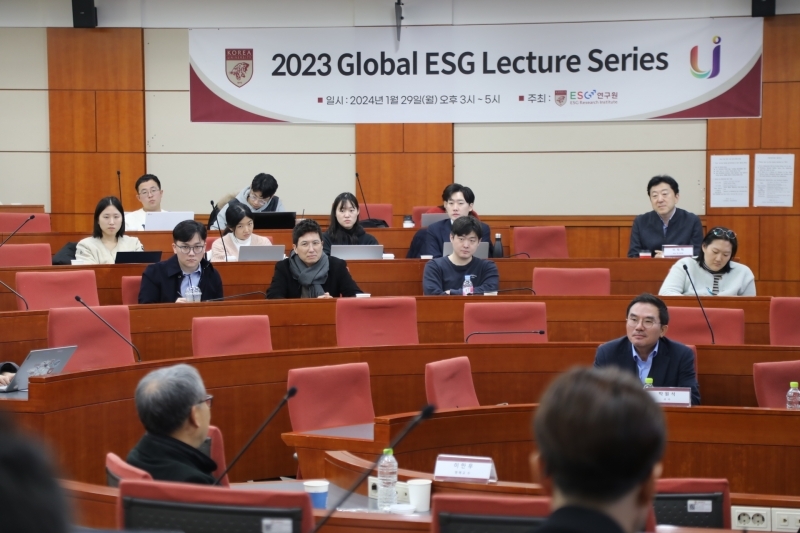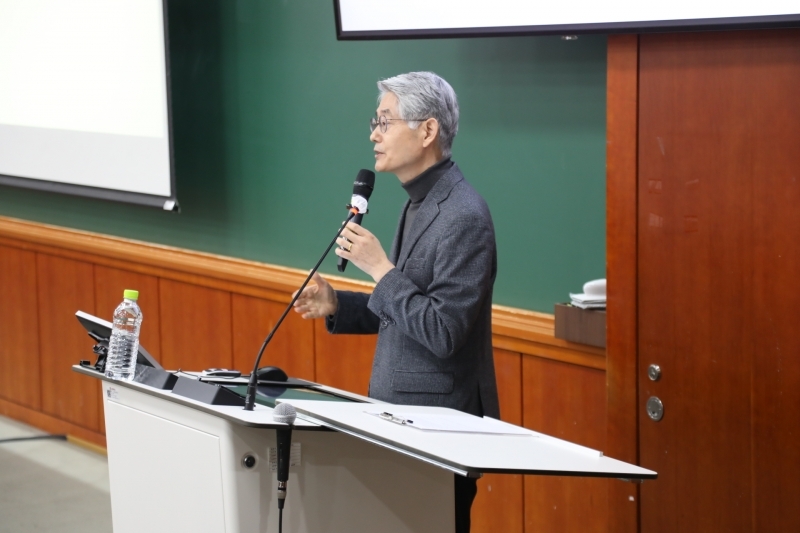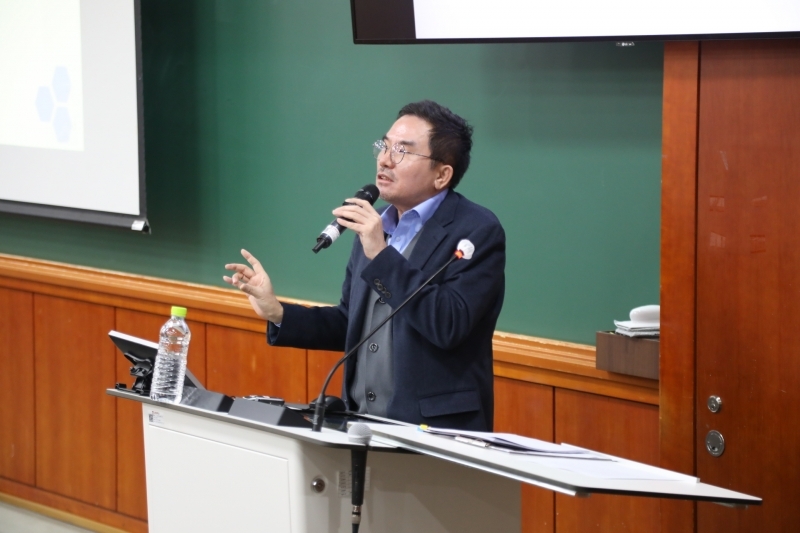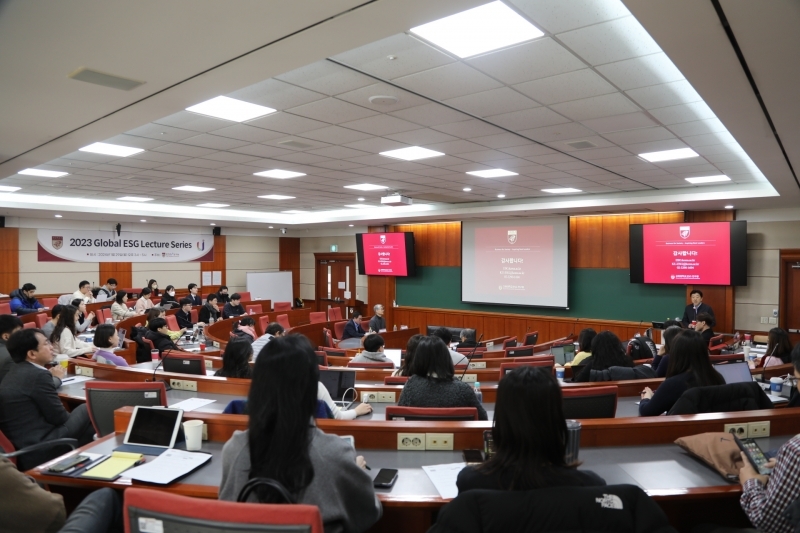News
KUBS News
“Adding the Color of Green Environment to Business” Completion of the 2023 7th Lecture Series on ESG
2024.03.13 Views 2488 국제실
“Adding the Color of Green Environment to Business” Completion of the 2023 7th Lecture Series on ESG
The 7th lecture of the 2023 ESG Lecture Series organized by the ESG Research Institute of Korea University Business School (Director: Lee Jaehyuk), was held on January 29th, Tuesday, at 3 p.m. in the LG-POSCO Management Hall. This series aims to invite top scholars in the ESG field to share key topics related to ESG in domestic companies and industries to develop academic research and educational content related to ESG, and to support research in both public and private sectors. Additionally, it facilitates projects for undergraduate students annually, where teams are mentored by the KUBS faculty. They analyze companies over six months and present their research results. Furthermore, it supports research on ESG management cases for faculty and hosts ESG-related colloquiums and lecture series.
The keynote speakers for this lecture were former Climate Change Ambassador Kim Chanwoo and Professor Park Wonseok from the Graduate School of Law at Chung-Ang University. Center Director Lee Jaehyuk stated, "The purpose of the ESG lecture series is to invite practitioners from various fields and introduce them to undergraduate students."

The first part of the lecture was delivered by Professor Kim Chanwoo. Professor Kim, who works as an adjunct professor at Kyungsung National University, has been involved in environmental diplomacy at the Ministry of Foreign Affairs since 1998. In particular, he has served as a representative of Korea in various negotiations such as the post-2012 climate negotiations and the Paris Agreement. Professor Kim Chanwoo has authored famous books such as ⌜21st Century Environmental Diplomacy⌟, ⌜Post-2012 Climate Negotiations⌟.
Professor Kim emphasized the importance of analyzing whether ESG is a sustainable topic or a temporary phenomenon, and he approached the ESG topic from the perspective of environmental diplomacy. The first part of the lecture was divided into three main topics in the following order: △the goals of climate change agreements △the start of the new climate regime △ the importance of technology development and international cooperation for environmental protection. Professor Kim stated, "The goal of climate change agreements is to stabilize greenhouse gases in the atmosphere to prevent human interference with the climate system." In the climate change regime, seven greenhouse gases are identified, with carbon dioxide accounting for two-thirds of the total greenhouse gas emissions, and when additional factors such as deforestation are considered, it accounts for three-quarters of the total greenhouse gas emissions. Therefore, when the international society proposes measures to reduce greenhouse gases in response to climate change, carbon dioxide is the most discussed. According to Professor Kim, the international community currently requires countries to voluntarily set reduction targets for greenhouse gases every five years, and in addition to each country's own reduction targets, additional reduction targets are set when conditional support is provided by the international community.

The discussion and criticism of the new climate regime followed. The new climate regime refers to international agreements between countries to regulate and prevent global warming, aiming to replace the Kyoto Protocol, which is scheduled to expire in 2020, with a new climate change regime, which soon became known as the Climate Change Agreement and the Paris Agreement combined. Professor Kim stated, "When analyzing the specific procedures provided by the implementing order, the Paris Agreement, it shows that global efforts for environmental protection at the global level are far from sufficient."
During the Q&A session at the end of the lecture, when asked about solutions to climate change, Professor Kim Chanwoo stated, "The role of the international community in addressing climate change is to buy time and encourage individual actors to act." He continued, "I am personally a reflective optimist who believes that, just as vaccines that would have taken 10 years to develop were developed in one year when COVID-19 struck, society is evolving into one where technology can be rapidly introduced through internet technology and others in the era of non-face-to-face interactions, so we need to develop technological solutions, which are the fundamental solution." He advised, "For South Korea to continue to be a leading country in the future, individual companies and subunits must actively act in line with the vision of the country."

Professor Park Wonseok took charge of the second part of the lecture, titled "Kunming-Montreal GBF, NBSAP, and ESG." Professor Park, who has served as an advisor to the negotiation delegation for the Convention on Biological Diversity and as a representative for the Nagoya Protocol negotiation delegation at the Ministry of Environment, is currently a professor at the Graduate School of Law at Chung-Ang University. The "Kunming-Montreal GBF" refers to the new "Global Biodiversity Framework (GBF)" adopted in Montreal, Canada, on December 19th of last year to preserve global biodiversity and components over the next 27 years until 2050. Professor Park stated, "In addition to the Kunming-Montreal GBF, five additional implementation mechanisms were collectively adopted to realistically implement this framework." He continued, "The Kunming-Montreal GBF is evaluated as a very radical and high-level content biodiversity agreement with execution methods which cannot be compared to existing implementation strategies."
Professor Park believes that to protect biodiversity, it is important to make companies and all countries feel the importance of biodiversity ultimately leading to the conclusion of international treaties. He introduced examples of international treaties, saying, "At the end of 2022, individual countries created biodiversity strategies tailored to each country's circumstances through the 'Global Biodiversity Framework' in Canada." Professor Park also foresaw that discussions on the value of ESG would continue beyond temporary trends from the perspective of biodiversity conservation. He said, "Key indicators on how to implement ESG in fields such as the marine environment are being developed, and concrete measures are being proposed," and predicted, "When countries implement biodiversity strategies, they will adopt and utilize these ESG-related indicators."

Finally, regarding the future of the Convention on Biological Diversity, Professor Park Wonseok stated, "The Ministry of Environment will create guidelines related to biodiversity by 2025," and warned, "In a sense, even in the most environmentally unfriendly field of business, if we do not add the color of green environmental friendliness, both companies and organisms may not be sustainable."


